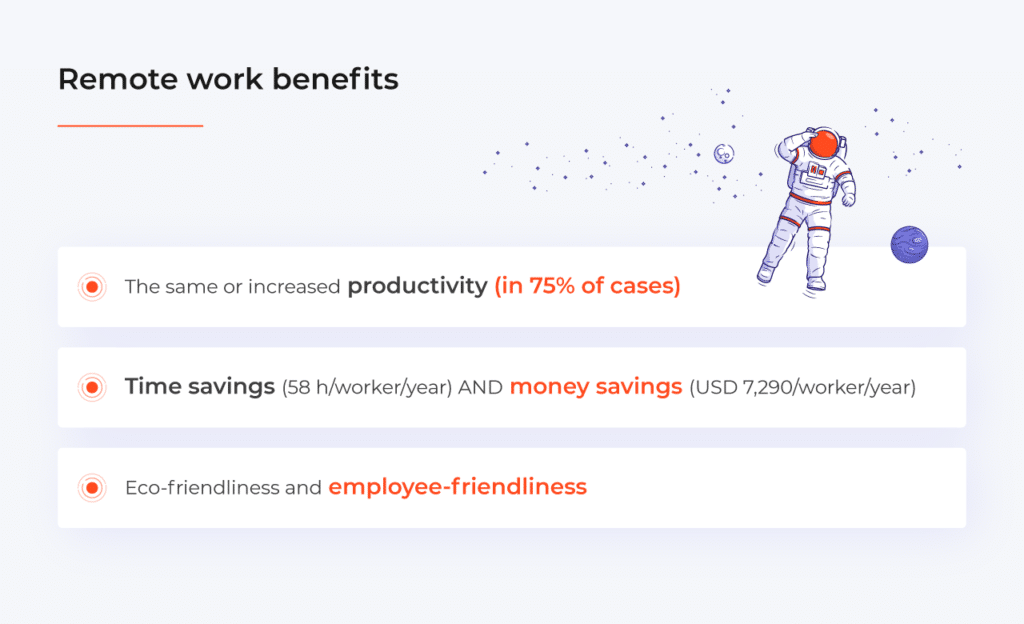Tech companies vs. the pandemic – how it’s going vs. how it’ll end

The world economy has survived many crises. But the coronavirus pandemic is a real game-changer. COVID-19 has completely reshaped how we do our jobs and how companies work. Many businesses suffered great losses with millions of people furloughed or unemployed. On the other hand, some industries observed their profit soar along with the COVID-19 surge. These were often the ones that promoted working from home and provided goods and services without bringing customers to any places. The transition to telecommuting created the need for better remote work tools. As a result, tech companies developing them managed to make a lot of money during the pandemic. And current reports show that the trend is going to stay this way.
The dawn of the remote workers’ era
The coronavirus outbreak made us work and live like never before. Suddenly our friends, coworkers, and neighbors became a potential threat to our health. All things not connected with our basic needs were banned. This situation put many sectors at a disadvantage. McKinsey explains that the most harmed businesses were those relying on physical presence, e.g. retail stores, banks, post offices, hotels, restaurants, airports, and entertainment venues.
Many companies had to adapt to the changing situations, and their employees had to learn how to work from home. Ironically, employers who used to say that remote work is impossible suddenly were forced to implement it. Global Workforce Analytics informed that the main issue of shifting to remote working was lack of trust – managers thought their employees wouldn’t work outside the office. The latter also had a lot on their plate – juggling work, chores, family, pets… CDC also warned that workplace stress could lead to burnout, especially when added to general coronavirus-related anxiety. In the end, everyone worried if jobs could be done equally efficiently.
On the other hand, some companies started flourishing along with COVID-19. Forbes states that DoorDash, GrubHub, Uber Eats, Amazon, Zoom, and Netflix increased their customer portfolio during the pandemic. They did so thanks to us being stuck at homes – video streaming was our cinema while ordered food was our restaurant. Forbes goes on to say that “Zoom became a video conferencing leader during COVID-19.” Not a surprise – it’s enough to ask around. But Zoom’s revenue growth of 191% in January-April 2021 reported by MarketWatch clearly shows that the pandemic was more like a jackpot for tech companies.
Telecommuting – the new standard
Setting up remote work
In the beginning, we were unsure how long the COVID-19 pandemic would last. But after some time passed, companies had to adopt telecommuting/telework (Lifewire explains what telework and telecommuting is) as a standard. This digital transformation required organizational as well as instrumental changes. EY discusses three areas you need to deal with when moving to work from home:
- organizing the remote work;
- providing the right infrastructure (including tools);
- providing work-life balance for employees.
Point no. 2 is where tech companies step in. The right tools are essential for successful telecommuting. They allow you to put your tasks together and enable constant communication with your team. That is why the pandemic outbreak equals a popularity boom in terms of work management tools such as Monday.com or Freshworks which allow for organizing tasks and monitoring efficiency without onsite meetings. It’s also hard to imagine contacting others without solutions such as Zoom, Microsoft Teams, or Grape. This leads us to two conclusions:
- you can use solutions to do your work from home and still get the job done;
- companies making these remote working tools are more likely to gain profit during the pandemic.
Tech companies on the rise
Point no. 2 shows us (again!) how big tech companies are profiting right now. The other reason for their success is that they were already used to remote working in the pre-pandemic era, so they could adapt and develop much faster. We can observe this even in Deviniti – our digital transition was smoother than in the case of companies from different sectors. Need more proof? Let’s talk numbers.
AP news reports that only 3 large tech companies (Apple, Microsoft, and Alphabet – Google’s parent company) made a combined profit of USD 50 billion in just three months (April-June 2021). The New York Times drives these numbers up – the combined yearly revenue (April 2020-2021) of Amazon, Apple, Alphabet, Microsoft, and Facebook amounts to USD 1.2 trillion. This shows the rapid development of tech companies and indicates the change in our buying habits. We simply need Facebook for our work/leisure time, Amazon to deliver our goods, Apple to provide electronic tools, Google and Microsoft to facilitate our work. That’s why they were able to quickly drive such great profits. But where is this going?
Tech future still bright?
When the tech boom is over…
Tech companies won the pandemic. But will their winning streak go on like this? Yes, but not to such an extent. CNBC makes certain predictions about several tech companies:
- Roku lost 6% in share value as it’s revealing a significant drop in the use of their platform and supply issues;
- Etsy reported a decrease due to their erroneous prediction of future trends and removing facemasks from their offer;
- Apple lost on stocks after informing the public about a shortage of key product components;
- Although Amazon reported significant growth, the company is expecting business to slow down in Q3 2021;
- Facebook also predicts a slower Q3 2021 in terms of ad sales.
But the fact that the initial boom is over doesn’t mean that profits will decline. CNBC adds that Amazon and Facebook still expect a double-digit percentage growth in revenue. So, tech companies will continue to grow but more stably. Of course, this will only be true if the pandemic doesn’t suddenly change its course. And speaking of setting a course, let’s see what might happen to our working life after the pandemic.
Firstly, telecommuting is likely to become a business standard, so the need for new tech solutions and contactless activities will remain. This leaves a lot of ground for tech companies to offer their products or services. Secondly, even with new COVID-19 vaccines and restrictions, the situation is quite unpredictable. That is why tech companies that manage to create the most likely what-if scenarios and provide tailor-made solutions can in most cases win the market over. But the most likely scenario is the permanent impact that the pandemic has made – embracing remote work.
Remote work – fad or trend?
You probably considered the pros and cons of working from home many times during the transition period. Even if the beginning is always the hardest, the benefits of working remotely eventually outweighed the downsides. And we have hard data to prove it:
- 75% of surveyed workers reported an increase in productivity when working remotely;
- Employees spend up to 58 extra hours per year doing their core work thanks to time savings;
- Companies save USD 7,290 per worker per year thanks to reducing office upkeeping costs;
- Working from home reduces energy consumption by 50% thus protecting the environment;
- Companies promoting working from home can have better employees by hiring people from abroad, people with disabilities, or people with small children.
These advantages of working from home probably won’t go unnoticed. Although we need other people around to stay sane, we can also gain a lot from working remotely. That is why the trend of telecommuting will most probably be much stronger once the pandemic is over. Forbes provides survey results in which 1/2 of respondents believe that about 40% of their companies’ employees will still work remotely to some extent. But that’s not all.
A Gartner survey showed that almost 75% of their interviewed CFOs were ready to turn at least 5% of their employees into remote workers. And more people working from home means more opportunities for tech companies to make their work easier. So, as bad as the pandemic is, it has helped us make a few discoveries about telecommuting and certainly opened a few doors for tech companies to grow.
What’s next?
Nobody knows when the pandemic will be over. Still, we can say for sure that the pre-pandemic attitudes won’t return, and the future belongs to working from home. Maybe not entirely, but to a greater extent than before. The post-pandemic business will become more flexible and adaptive – always in need of better solutions to improve management and communication, thus generating more chances for both big and small technology companies. Their share in the market will grow steadily as more businesses learn to appreciate working remotely. Our only hope is that companies, in general, will manage to overcome difficulties, and this horrible pandemic will also bring something good – help us improve businesses and humanity as a whole.
We wish you a stable internet connection and a strong team spirit to support your remote work. If you are looking for specific solutions to successfully manage your work from home or improve communication, try out these tools. If you would like to learn more about company organization and management (not only) during the pandemic, read here:


